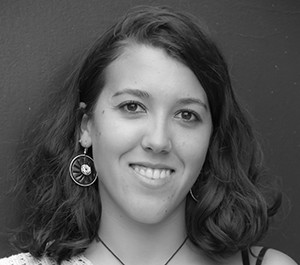Marine Quennehen

INED post-doctoral fellow Marine Quennehen studies ties between imprisoned fathers and their children in France and has answered some questions on her research.
(Interview conducted in May 2020)
Why study fatherhood in prison?
In the preparatory survey I did as a Masters student, I observed that there had never been a specific study on fathers in prison in France despite the fact that a 1999 INSEE survey on inmates’ family histories showed that half of them were fathers. There were studies on how having a parent in prison affects family ties and those studies took into account the experience of inmates and their relatives, but the literature on “parenthood” in prison focused primarily on mothers. It should be recalled that 97% of the prison population in France are men. So the purpose of my thesis was to remedy this “blind spot.”
How did you conduct your research? What methodology did you use?
I conducted reiterated semi-directive interviews (approximately 150 in all) with 70 inmates in four different prisons (two holding/light sentence/end-of-sentence centers and two detention facilities). The objective of the interview methodology was to obtain a retrospective account and then to return in the later interviews to specific life history events. Seeing inmates more than once reduced respondent-interviewer distance and worked to build a trusting relationship. Reiterated interviews encouraged respondents to view their experience reflexively.
Meanwhile I conducted approximately fifteen individual and collective interviews, some of them informal, with several prison actors (male and female guards, senior guards, health care personnel, social workers).
Health care personnel of the regional medical-social psychological service (SMPR) together with probation and penitentiary integration counselors (CPIP) were essential when it came to recruiting my survey sample. I indicated a few respondent selection criteria: being a father, and not having committed incest or violence against one’s children or being in prison for murdering their other parent. I also excluded inmates with severe psychological disorders. I chose these criteria because my subject was “ordinary” fathers in prison, not fathers in prison for crimes against their children or family. Detention facility inmates received a letter describing the survey, and could refuse to participate. In the case of inmates awaiting trial or completing their sentences, I met with them individually to present my study.
What are some of your findings? Parenting has been disrupted, of course, but do parenting practices continue for these fathers or are they interrupted?
Does incarceration change perceptions of the “father” role (those of the fathers themselves and other family members)?
The main finding of my thesis is that inmates’ parental, conjugal, and social trajectories vary. Their parenthood-related practices are different and they define themselves as parents in a range of different ways. I identified four ways of experiencing one’s paternity in prison, which I called marginal paternity, suspended paternity, shattered paternity, and paternity as a resource. This typology moves us beyond a totalizing view of fatherhood in prison. I showed that while incarceration did of course have an undeniable impact on these men, there was also continuity between their pre-prison and in-prison trajectories. Marginal paternity was a situation found for men who had become fathers early. For these men, the prison environment was not conducive to appropriating a parental role, a role they had hardly experienced, if at all, before going to prison. Suspended paternity is defined as temporary interruption of the parent-child relationship; the relationship gets postponed to a hypothetical post-prison future. Some of these inmates had never lived with their children; their relations with them were distant well before their incarceration and they were not interested in defining themselves in terms of their fatherhood. Shattered paternity describes men who wanted to play a parental role but could not because they were in prison; this category experience strong feelings of disqualification. And paternity as a resource concerns men who can rely on strong family solidarity; their children are catalyzers for future plans both in and after prison (getting job training or more education, finding a job, achieving conjugal stability).
These paternity types are certainly not fixed. They inform us on parenthood-related practices and representations of fatherhood by way of life history events.
How does the prison institution handle the question of parenthood?
My study brought to light one of the paradoxes of the institution. Whereas the institution’s objective is to make family ties a means of reintegrating inmates, when inmates make requests or demands that would sustain those ties, the institution distrusts them and fails to grant them the recognition they expect. What I observed in my interviews with and observation of different prison-related professionals (male and female guards, head guards, health care personnel, social workers, judges) is that fatherhood does not really count for them as a reintegration lever. The prison institution reproduces existing gender norms, essentializing female inmates as mothers while reducing men to their identity of inmate and not really taking into account the fact that they belong to a family sphere (despite existing arrangements). The institution has a difficult time recognizing the heterogeneity of parental situations experienced by male inmates.
